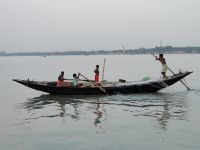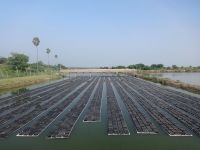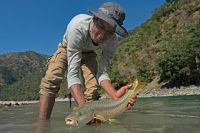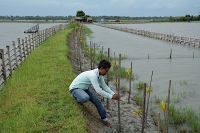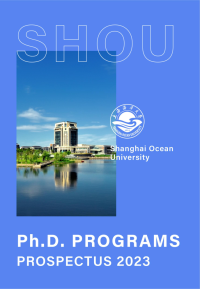Hilsa (Tenualosa ilisha) is highly favoured as a food fish by consumers but has a complex life cycle and has proven very difficult to breed. Domestication of hilsa requires extra effort while nurturing the larval stage, which is very sensitive and susceptible to mortality. This article describes standardised protocols developed by the Kalyani Field Station of the ICAR-CIFA Regional Research Centre, Rahara, for artificial fertilisation, incubation and larval rearing of hilsa, as the first steps towards the goal of hilsa domestication and culture.
In West Bengal wild-caught juvenile and sub-adult orange-clawed mud crabs Scylla olivacea are purchased by farms for grow out, fattening, and the production of soft-shell crab for export. This article describes the management practices for producing soft-shell mud crab at National Aqua Farm, using individual box enclosures, and their subsequent processing and packing for export. Details of the crab rearing unit are provided, along with observations of moulting cycles and post-harvest management of soft shell mud crab.
Establishing recreational fisheries in Uttarakhand's highland lakes and river systems offers new opportunities to generate livelihoods and income for hill people. The development of catch-and-release sport fisheries can also contribute to conservation of aquatic biodiversity through development of captive breeding technologies, supportive breeding based stock enhancement, and community participation in management of both fishery and habitat. This article describes established and emerging sport fisheries in the highlands of Uttarakhand including for mahseer, goonch and brown trout. It also addresses as yet unrealised opportunities for establishment of recreational fisheries identified through geoinformatic approaches, and partnerships between local communities and government in natural resource management.
Nature-based solutions are interventions that aim to protect, restore and sustainably manage natural and modified ecosystems to benefit human well-being and biodiversity and address societal concerns. Integrated mangrove-shrimp farming or simply aquaculture is the coexistence of mangroves and shrimp aquaculture in a tide-fed environment. In comparison to other shrimp farming systems, integrated mangrove-shrimp farming can additionally produce timber and supports biodiversity. To understand the possible benefits of mangrove integration, our consortium compared three integrated mangrove-aquaculture systems together with three local farmers in North 24 Parganas. This article describes our findings, and important factors to consider before deploying integrated mangrove-aquaculture systems.
Shanghai Ocean University (SOU) is offering full scholarship PhD programmes in a wide range of marine sciences 2023. Disciplines include: Aquaculture, biology, fishing science, fisheries resources, marine science, food science and engineering, fishery economics and management, and marine engineering and information. The scholarships cover tuition, accommodation, medical insurance and include a monthly stipend.
Applications are due 1 February 2023. For details of the programmes, eligibility criteria, required documentation and application procedures, please download the prospectus. Postdoc positions are available for excellent graduates and full-time faculty positions are available for excellent international postdocs.
